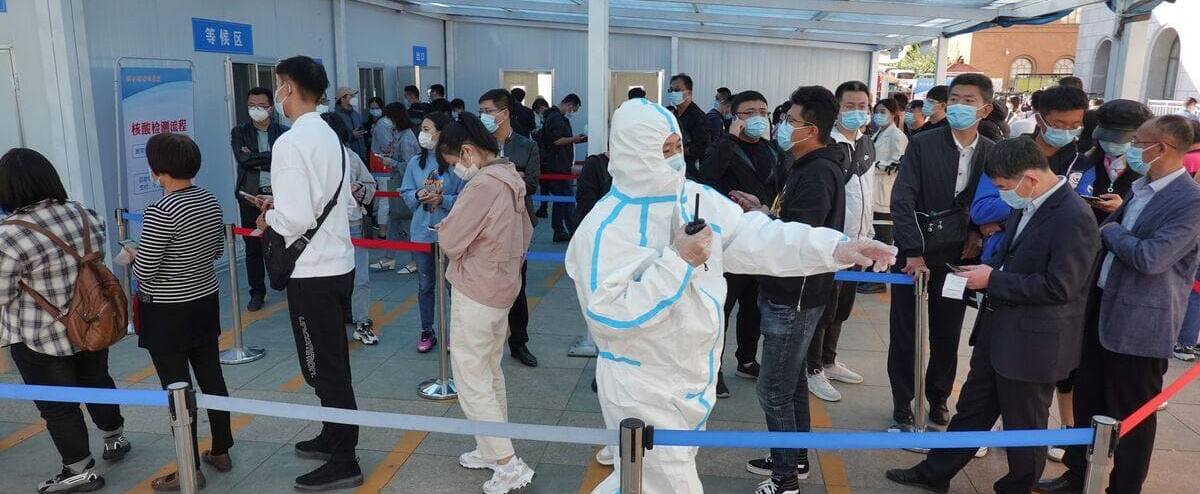China is carrying out a massive screening campaign on Monday in a major port city after the discovery of six cases of COVID-19, while European countries take drastic measures in the face of a new surge in cases of contamination.
• Read also: All developments in the COVID-19 pandemic
The nine million inhabitants of the metropolis of Qingdao [est] will be subjected to these tests within five days, after the discovery of six cases of infection on Sunday, fueling fears of a resurgence of the epidemic.
According to local health officials, all of the infected appear to have a connection to a city hospital that treats COVID-19 patients. But the focus of infection is not yet known.
• Read also: Encouraging results of a drug in animals
• Read also: US invests in treatment
The discovery resulted in the screening of some 143,000 people to try to identify contact cases.
The Asian country, where the new coronavirus appeared at the end of 2019, claims to have for several months contained the epidemic on its soil thanks to strict controls, the wearing of the generalized mask, the containment measures and the applications of tracing.
Since its appearance in China, the pandemic has killed at least 1,075,493 people around the world, according to a report established by AFP from an official source on Monday morning.
Faced with a resurgence of cases, the United Kingdom, the hardest hit country in Europe with more than 42,800 dead, is preparing to tighten restrictions, after registering nearly 13,000 new cases on Sunday.
Boris Johnson must thus announce in the afternoon a new system with three alert levels which will determine the measures to be applied in the English regions, according to the spread of the new coronavirus.
The British Prime Minister will speak in the House of Commons, the lower house of Parliament, before addressing the nation in a televised press conference.
The new alert system plans to divide England into different alert levels, “medium”, “high” and “very high”, depending on the spread of the virus, which will determine the measures to be applied locally.
“This is a critical time and it is absolutely vital that everyone follows the clear guidelines we have given to help contain the virus,” a Downing Street spokesperson said.
In France, two new large cities, Toulouse and Montpellier in the South, will be placed on “maximum alert” from Tuesday, the authorities announced.
New contaminations (more than 16,000 in the last 24 hours) continue to increase, as well as intensive care admissions (1,483 patients on Sunday, a record since May).
Prime Minister Jean Castex did not rule out Monday from carrying out reconfigurations in certain regions, believing that “nothing should be excluded when we see the situation in our hospitals”.
And two Spanish regions bordering France, Catalonia and Navarre, will strengthen their restrictions from Tuesday.
Meetings will notably be limited to six people in Navarre, while bars and restaurants will have to close at 10 p.m. Cinemas, theaters and bookstores will have to reduce their attendance to 30% and supermarkets to 40%.
In Catalonia, the authorities have called on companies to encourage teleworking and universities to avoid face-to-face lessons.
On the other hand, Italy, the first affected country in Europe, plans to lighten its anti-COVID-19 health protocol by reducing the quarantine to 10 days.
In total, more than 37.4 million cases of infection have been officially diagnosed, of which at least 25,827,919 have been cured, according to a report established by AFP on Monday.
India crossed the threshold of seven million cases on Sunday, a figure that is close to that reached by the United States.
But the United States remains the most bereaved country, with more than 214,000 deaths and 7.7 million cases, including Donald Trump himself. The US president, 74, declared himself “immune” to COVID-19 on Sunday after being hospitalized last week.
“It looks like I’m immune, for – I don’t know – maybe a long time, maybe a short time, maybe for life. Nobody really knows, but I’m immune, ”he said.
He begins a marathon of meetings on Monday with the hope of catching up on Joe Biden by the November 3 election.
However, the issue of immunity to COVID-19 remains surrounded by many unknowns: we do not know precisely the degree of protection offered by antibodies or the duration of any immunity.
And a new study found on Monday that the coronavirus that caused the COVID-19 pandemic can, in cool, dark surroundings, survive for up to 28 days on surfaces like phones and banknotes.
According to a study by the Australian National Science Agency (CSIRO), researchers found that the warmer the temperatures, the lower the survival rate of SARS-CoV-2.
 Canada Live NEWS – 24/7 Breaking Headlines & Updates Canada Live News is one of the largest news curating sites across Canada which is made exclusively for Canadian people.
Canada Live NEWS – 24/7 Breaking Headlines & Updates Canada Live News is one of the largest news curating sites across Canada which is made exclusively for Canadian people.
![[EN DIRECT 31 OCTOBRE 2020] All developments in the COVID-19 pandemic 2](https://m1.quebecormedia.com/emp/emp/8a7a1600-1ae2-11eb-8c4b-fb794571f4f6_ORIGINAL.jpg?impolicy=crop-resize&x=0&y=36&w=1200&h=494&width=1200)